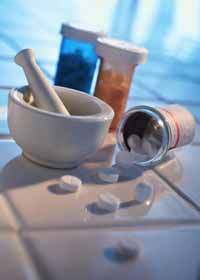China orders drug company to stop operations amid spreading bribery scandal
A Chinese drug company has been ordered to stop production amid an investigation into allegations that pharmaceutical companies were bribing State Food and Drug Administration officials for approvals, reports said Wednesday.

Meanwhile, the Health Ministry issued new rules that would bar drug companies from doing business with Chinese medical institutions and revoke doctors' licenses if they are caught giving or taking bribes or kickbacks, the official Xinhua News Agency said Wednesday.
Chinese drug companies have been accused of paying off doctors, health officials and hospital staff to buy substandard drugs, leading to deaths and injuries, raising serious questions about the safety of medicines sold and prescribed throughout the country.
Last year, Xinfu, an antibiotic approved by China's State Food and Drug Administration killed at least 10 patients before it was taken off the market, according to state media.
Authorities are investigating a former drug administration chief, Zheng Xiaoyu, who is accused of allegedly taking bribes in exchange for ignoring drug approval regulations. Two former department directors, including one responsible for drug registrations, are also under investigation.
Kangliyuan Group, a drug company based in the eastern city of Hangzhou, was ordered to stop operations because of its alleged links to Zheng, the state-run newspaper China Business News and other reports said.
The reports said the Communist Party's anti-graft watchdog, the Committee for Discipline Inspection, was investigating.
Staff who answered the phone at Kangliyuan's headquarters Wednesday said the company spokesman was not immediately available for comment.
A statement posted on the company's Web site acknowledged that the company's certificate of "Good Manufacturing Practice," which is required for legal production, was temporarily suspended pending the outcome of the investigation. It did not say if the company had stopped production, however, or comment on the allegations.
Zheng, a former pharmaceutical company manager from Hangzhou, was removed from his post after serving eight years as China's top drug official. He was detained in December.
Many of the allegations focus on the awarding of "Good Manufacturing Practice" certificates and drug registrations. A corruption agency report cited by China Business News said a Kangliyuan subsidiary based in southern China's Hainan island was given a GMP certificate in 2002 and was winning approvals for about 100 new drugs a year.
The reports alleged that the company was merely repackaging generic drugs, sometimes adding neutral ingredients. However, they mentioned no complaints about any specific drugs.
Last week, China's Food and Drug Administration announced it was investigating a company, Guangdong Bioyee Pharmaceutical, suspected of using illegally procured blood stocks to make immunoglobulin and other drugs, possibly infecting patients with hepatitis C.
On Tuesday, the agency announced that its study had found no cases of acute hepatitis caused by the drug. But some patients had developed hepatitis C antibodies, suggesting the company had used tainted blood to make the product, it said in a notice on its Web site.
China began requiring that all drugs be approved by the State Food and Drug Administration only in 2002. That move created a massive backlog, giving companies a strong incentive to find ways to expedite approvals, often of bogus or dangerous drugs, reports AP.
At the same time, hospitals and doctors tend to overprescribe medicines because they rely heavily on drug sales for their income.
According to Xinhua, the new Health Ministry rules would ban companies caught paying bribes from doing business with medical institutions for up to two years. Since hospitals and clinics account for a big share of drug purchases, that could bankrupt a drug maker.
Subscribe to Pravda.Ru Telegram channel, Facebook, RSS!





